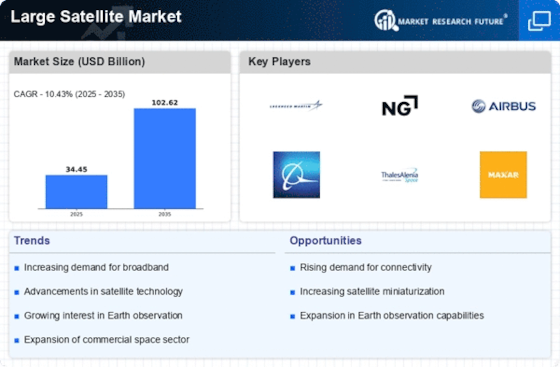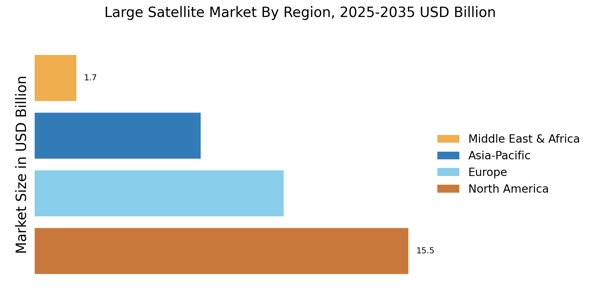Increased Demand for Connectivity Solutions
The demand for connectivity solutions is a primary driver in the Large Satellite Market. As societies become increasingly reliant on digital communication, the need for robust satellite networks has surged. This is particularly evident in regions with limited terrestrial infrastructure, where satellites provide essential services. The market is expected to witness a substantial increase in revenue, with projections indicating that satellite communication services could reach a valuation of over 100 billion dollars by 2027. This growing demand is prompting investments in large satellite systems that can deliver high-speed internet and reliable communication services across diverse sectors, including telecommunications and emergency response.
Emerging Applications in Defense and Security
The Large Satellite Market is witnessing a surge in demand for applications related to defense and security. Governments are increasingly investing in satellite systems for surveillance, reconnaissance, and secure communication. The geopolitical landscape has heightened the need for advanced satellite capabilities, with military budgets allocating significant resources to space-based technologies. The market for defense satellites is anticipated to grow, with projections indicating a potential increase in spending by over 7% annually. This trend underscores the strategic importance of large satellites in national security and defense operations, as they provide critical intelligence and situational awareness.
International Collaborations and Partnerships
International collaborations are playing a pivotal role in shaping the Large Satellite Market. Countries are increasingly forming partnerships to share resources, technology, and expertise in satellite development and deployment. These collaborations often lead to cost-sharing initiatives and joint missions, enhancing the capabilities of participating nations. The market is likely to benefit from these alliances, as they facilitate access to advanced technologies and foster innovation. Furthermore, such partnerships can accelerate the deployment of large satellite systems, enabling countries to address common challenges, such as climate change and disaster response, more effectively.
Technological Advancements in Satellite Design
The Large Satellite Market is experiencing a transformative phase driven by rapid technological advancements. Innovations in materials science, miniaturization, and propulsion systems are enhancing satellite capabilities. For instance, the integration of high-throughput satellites (HTS) is enabling unprecedented data transmission rates, which is crucial for applications such as broadband internet and remote sensing. The market is projected to grow significantly, with estimates suggesting a compound annual growth rate (CAGR) of over 5% in the coming years. These advancements not only improve performance but also reduce costs, making large satellites more accessible to a wider range of customers, including governmental and commercial entities.
Focus on Sustainability and Environmental Monitoring
Sustainability is becoming a focal point within the Large Satellite Market, as stakeholders recognize the importance of environmental monitoring. Large satellites equipped with advanced sensors are increasingly utilized for tracking climate change, deforestation, and natural disasters. This trend is supported by governmental initiatives aimed at enhancing environmental protection and resource management. The market for Earth observation satellites is projected to expand, with estimates suggesting a growth rate of approximately 6% annually. By leveraging satellite technology, organizations can gather critical data to inform policy decisions and promote sustainable practices, thereby aligning with global environmental goals.

















